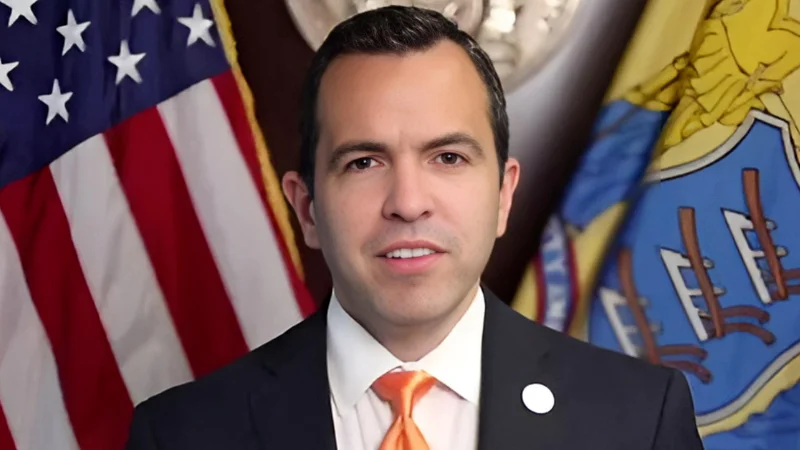
Attorney General Matthew J. Platkin has appointed Joseph D. Wysocki, former chief of the Camden County Police Department, as acting director of the Office of Law Enforcement Professional Standards (OLEPS). This follows the retirement of Director Kevin D. Lutz on July 1, 2025.
“Accountability and transparency are critical to ensuring that the public has confidence in our law enforcement professionals,” said Attorney General Platkin. “OLEPS is key to this process. Joe Wysocki has had an extensive and wide-ranging career in law enforcement, and his credentials are second to none. I know he will be vital in his new role and will continue the outstanding work that has been done by Director Lutz.”
“I am honored to be appointed as the Acting Director of the Office of Law Enforcement Professional Standards and thank Attorney General Platkin for this opportunity,” said Acting Director Wysocki. “Having enjoyed my time working under Director Lutz, I am committed to building on the strong foundation he built. I am dedicated to advancing OLEPS’ mission and will continue to strengthen relationships with our partners and promote effective and unbiased policing.”
Wysocki’s background includes both uniformed and investigative roles at Camden County Police Department, where he led internal affairs operations within the Professional Standards Bureau. He introduced new operational procedures for oversight, established an early warning system for officers, implemented technology-driven solutions for transparency, and oversaw all internal investigations involving department personnel.
During his tenure as chief of police in Camden, crime rates reached a 50-year low while community outreach programs were expanded alongside new crime-fighting strategies and training initiatives.
Kevin D. Lutz served as OLEPS director from January 1, 2024 until his retirement in July 2025. His career included service with Oaklyn Police Department after four years in the U.S. Marine Corps before joining Camden City (later Camden County) Police Department in 2006 where he held various command positions including SWAT team leadership, homicide investigations, narcotics task force participation, training roles, community outreach efforts, professional standards assignments, and later became chief of police at Rutgers University Police Department-Camden.
In addition to announcing Wysocki’s appointment, OLEPS and New Jersey State Police (NJSP) revealed updates to state police internal affairs policies covering policy changes, training improvements, reporting enhancements, and technology upgrades.
Director Lutz and Colonel Patrick J. Callahan formed a working group in fall 2024 aimed at revising NJSP’s Standing Operating Procedure for internal investigations so it aligns with statewide Internal Affairs Policy guidelines set by the Attorney General’s office.
“Nowhere is maintaining public trust in policing more important than in the New Jersey State Police,” said Attorney General Platkin. “While the large majority of troopers perform their duties with professionalism and integrity, it is essential that we maintain an internal review process to ensure that every member of the NJSP serves at the highest standard. These updated procedures will help us get there.”
“Internal affairs plays a vital role in ensuring accountability and transparency within law enforcement agencies, which is the primary mission of OLEPS,” said Acting Director Wysocki. “These important policy changes ensure current best practices are being followed. I am proud of the efforts of the working group in accomplishing this task.”
“The New Jersey State Police remains committed to transparency, accountability, and building trust with the communities we serve,” said Colonel Patrick J. Callahan, Superintendent of the New Jersey State Police. “We welcome the opportunity to continue working with Director Wysocki and the Office of Law Enforcement Professional Standards to ensure our policies and practices reflect the highest standards of professionalism and integrity.”
“The updates to the Office of Professional Standards (OPS) policy manual will modernize state police’s internal affairs process and give the public confidence in one of the most critical aspects of operating a large law enforcement organization,” said former Director Lutz.
To address concerns raised during site visits about case backlogs or staff shortages within Internal Affairs Investigation Bureau (IAIB), NJSP increased specialized training for OPS personnel—such as advanced investigation techniques—and plans additional investigator hires.
OLEPS also expanded its channels for receiving complaints from both state police members or members of public through online forms on its website along with a hotline number and email address allowing anonymous submissions.
The OPS-OLEPS working group introduced several changes: they developed a civilian complaint information sheet; clarified time frames; updated terminology; revised guidance specifying which allegations can be reviewed by command staff; created clearer processes for closing cases when alleged conduct did not occur so investigators can focus on complex matters; allowed faster closure for cases deemed unfounded or exonerated.
Investigators identified inefficiencies caused by reliance on physical files during their reviews—leading OLEPS officials to direct OPS toward full use of their electronic case management system IAPro instead—enabling secure digital storage within division networks which saves significant time per investigation.